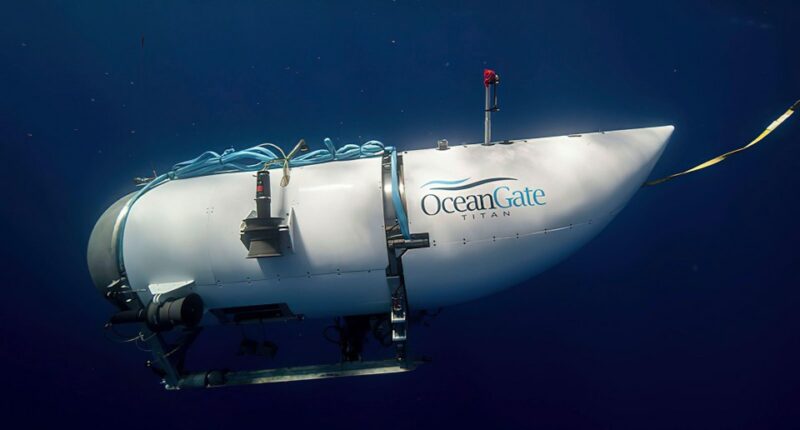Share this @internewscast.com
A DAMNING report into the doomed Titan sub has laid a bare catalogue of fatal failures and negligence that led to the deaths of five people.
The bombshell file also points squarely at OceanGate CEO Stockton Rush as the man to blame for the 2023 disaster.
The investigation spanning 335 pages, unveiled on Tuesday by the US Coast Guard, determines the disaster was “preventable” and rooted in “critically flawed” procedures, shortcuts in design, and a distressing safety culture within the deep-sea tourism company.
Rush, who perished in the implosion along with four others near the Titanic wreckage, was revealed to have “demonstrated negligence that played a role in the deaths of four people,” as outlined in the report.
In a stinging assessment, investigators said had Rush survived, they would have recommended the Department of Justice consider a criminal probe.
The report indicated: “For several years before the tragic event, OceanGate utilized intimidation tactics, leniencies for scientific activities, and their esteemed reputation to sidestep regulatory oversight.
The report’s 8 main findings:
- Oceangate ignored standard engineering protocols, which was the main cause of the tragedy.
- The sub imploded due to structural failure, instantly killing all five under extreme pressure.
- CEO Stockton Rush bypassed critical safety checks and procedures.
- The sub’s carbon-fibre design was flawed, and known issues were not addressed.
- A toxic work environment discouraged staff from raising safety concerns.
- Financial strain in 2023 increased risks to the Titan’s hull and operation.
- Existing regulators were inadequate for advanced submersible technology.
- If Rush had lived, a criminal investigation may have been recommended.
“By methodically crafting and taking advantage of regulatory ambiguity… OceanGate was eventually able to operate Titan entirely outside of the recognized deep-sea standards.”
The Titan, owned and operated by OceanGate Expeditions, imploded on June 18, 2023, while descending toward the Titanic site.
All five aboard — including British tycoon Hamish Harding, Pakistani entrepreneur Shahzada Dawood and his teenage son Suleman, French Titanic specialist Paul-Henri Nargeolet, and Rush — were instantly killed under the immense pressure of the deep ocean.
The report pinpoints eight significant causal elements leading to the implosion, with the Coast Guard determining that OceanGate’s neglect of fundamental engineering protocols – including adequate design, accreditation, testing, and upkeep – was the primary cause.
Investigators were blunt: “The lack of both third-party oversight and experienced OceanGate employees on staff during their 2023 Titan operations allowed OceanGate’s chief executive officer to completely ignore vital inspections, data analyses, and preventative maintenance procedures, culminating in a catastrophic event.”
Toxic culture & intimidation tactics
The Titan’s carbon fibre design – already a source of concern within the industry – was described as “flawed”.
Prior signs of structural issues were ignored, and the company fired or threatened employees who raised alarms.
The internal culture was so toxic, the report said, that safety complaints were suppressed under the threat of termination.
The US Coast Guard noted that OceanGate employees were “asked to temporarily forgo salaries with the promise of back pay” as the company faced mounting financial stress in 2023 — pressure that led to shortcuts with deadly consequences.
One former employee told investigators: “The company was economically very stressed and as a result, [they] were making decisions that compromised safety.”
And despite a whistleblower raising safety concerns as early as 2018, OceanGate failed to launch an internal investigation.
According to the report, if that complaint had been acted on, “early intervention could have resulted in OceanGate either aligning with regulatory requirements or abandoning its plans for Titanic expeditions altogether — therefore avoiding the implosion.”
CEO to blame
Rush himself is singled out for misrepresenting the Titan’s safety, reportedly describing the sub as “indestructible” – a claim the report says gave passengers a false sense of security.
In his dual role as CEO and pilot, Rush’s unchecked authority and lack of accountability created a perfect storm of risk.
The Coast Guard concluded that the “glaring disparities between [OceanGate’s] written safety protocols and their actual practices” exemplified a company willing to sidestep regulation and reason for the sake of spectacle.
Jason Neubauer, chairman of the Marine Board of Investigation, said the findings should serve as a watershed moment for the growing but loosely regulated private deep-sea exploration industry.
He said: “There is a need for stronger oversight and clear options for operators who are exploring new concepts outside of the existing regulatory framework.”
The report also flagged a broader issue: the absence of domestic and international oversight for manned submersibles like the Titan.
While it found no wrongdoing by the Coast Guard or other external agencies, the vacuum of regulation left a dangerous gray area that OceanGate exploited.




























